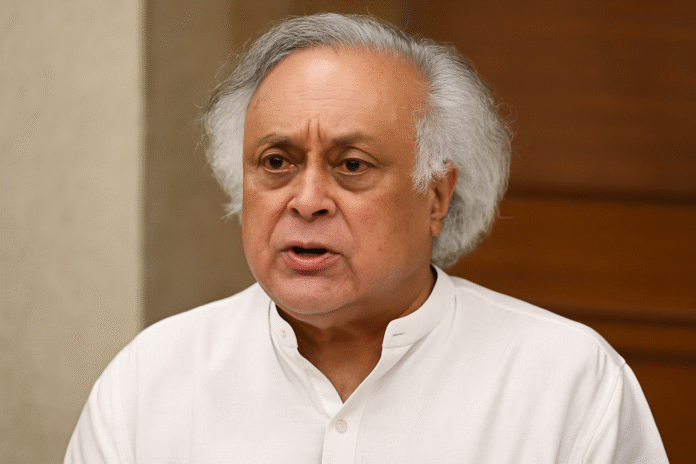Introduction
In a recent political outburst that has rekindled debates about the efficacy of political consultations in India, Congress leader and senior parliamentarian Jairam Ramesh has criticized the Modi-led central government for turning all-party meetings into “mere formalities” with “no real outcomes.” His sharp remarks came ahead of the Monsoon Session of Parliament, raising serious questions about the government’s sincerity in engaging with opposition parties.
This article explores the background, context, political significance, and reactions to Jairam Ramesh’s statement. It also delves into the broader implications such remarks have on democratic processes and legislative functioning in India.
What Did Jairam Ramesh Say?
In a press interaction and posts shared on social media, Jairam Ramesh, the Congress’ communications in-charge and Rajya Sabha MP, said: “These all-party meetings are conducted like rituals. There’s no effort to build consensus or incorporate inputs from the opposition. It’s just optics—nothing more.”
Ramesh’s statement underscores a growing sentiment among opposition parties that the Modi government is not genuinely interested in bipartisan cooperation or dialogue. The meetings, they argue, are structured to showcase inclusivity without actually enabling it.
Context: The Monsoon Session and Recent Political Backdrop
Ramesh’s comments came just before the 2025 Monsoon Session of Parliament, a period expected to be rife with political heat. Key issues likely to be discussed include:
- Implementation of the Uniform Civil Code (UCC)
- Unemployment and economic recovery
- NEET and other education-related irregularities
- Agnipath scheme performance review
- India’s stance on international trade deals
- Rising inflation and fuel prices
The all-party meeting, traditionally held before every session, aims to build consensus, streamline proceedings, and avoid disruptions. However, according to Ramesh and other opposition leaders, this objective has repeatedly fallen short.
A Pattern of Political Disregard?
Jairam Ramesh’s comments echo a recurring pattern in Indian politics over the last decade. Critics argue that the current regime often:
- Fails to share legislative drafts in advance
- Skips detailed parliamentary scrutiny
- Passes bills amid protests or walkouts
- Avoids meaningful debate by guillotining discussions
Such practices, they argue, reduce the role of Parliament to a rubber-stamp institution. While all-party meetings are held, their pro forma nature has undermined their intended purpose.
The Purpose of All-Party Meetings
In theory, all-party meetings are a vital part of India’s democratic architecture. They serve to:
- Set the agenda for the session
- Promote cooperation and dialogue
- Prevent legislative disruptions
- Facilitate floor coordination
Typically chaired by the Prime Minister or Parliamentary Affairs Minister, these meetings bring together leaders from all parties to share their expectations, issues, and priorities. Constructive outcomes can lead to smoother sessions and productive lawmaking.
However, when these meetings become symbolic rather than substantive, they defeat their democratic purpose.
Opposition’s Consistent Grievances
Jairam Ramesh is not alone in expressing frustration. Over recent years, several opposition leaders—including from TMC, DMK, CPI(M), AAP, and NCP—have echoed similar concerns:
- Bills are tabled and passed in the same session without adequate review
- Parliamentary committees are bypassed
- Question Hours are curtailed or suspended
- Issues raised by the opposition are often ignored or overruled
Such complaints highlight a perceived erosion of parliamentary norms, and Jairam Ramesh’s statement simply amplifies the collective opposition voice.
Government’s Response: Optics vs. Action
In defense, the government maintains that it does engage with the opposition, pointing to:
- The regularity of all-party meetings
- Invitations to opposition for key decision-making committees
- Parliamentary time allocated for debates (when possible)
However, critics argue that these are largely performative measures. Former Parliamentary Affairs Minister Pralhad Joshi, for instance, has repeatedly stated that the government wants smooth functioning of the House and values inputs from all stakeholders. But on ground, legislative speed often overshadows deliberative quality.
A Deeper Look: Is Parliament Losing Its Power
Ramesh’s outburst, while political, raises an important institutional question—is the Indian Parliament losing its relevance?
Consider the data:
- In 2023, 17 bills were passed in the Lok Sabha with less than 10 minutes of discussion
- Ordinances are increasingly used to bypass debates
- The Standing Committee system is underutilized
- Sessions are often adjourned or disrupted
If dialogue is missing both within the House and outside it, via meetings like the all-party gathering, India’s legislative democracy weakens.
Public Reactions and Media Coverage
Ramesh’s statement received wide media coverage and triggered a flurry of political debate. Social media users and political analysts weighed in:
- Some hailed him for calling out “performative governance”
- Others accused Congress of hypocrisy, recalling its own majoritarian moves when in power
- Hashtags like #AllPartyFarce and #JairamRamesh trended briefly on Twitter (X)
TV debates and op-eds discussed whether the Parliament is functioning as a deliberative body or simply executing executive will.
Comparative Lens: Global Parliaments and Consultation Culture
India is not alone in facing challenges in bipartisan consultations. However, some democracies offer better models:
- UK’s Speaker plays a stronger role in facilitating balanced debate
- Germany’s Bundestag mandates advanced draft sharing of bills
- The US Congress, for all its polarization, holds extensive committee hearings and public consultations
In contrast, India’s hurried legislative practices and “closed-door formalities” make it difficult for the opposition to engage meaningfully.
Congress’ Strategic Shift?
Jairam Ramesh’s statement could also signal a broader Congress strategy. Post its marginal gains in the recent elections, the party seems to be:
- Positioning itself as a watchdog for democratic integrity
- Aligning with other opposition parties on procedural issues
- Rebranding from passive opposition to assertive participant
The party may be aiming to claim moral high ground ahead of the next general elections, portraying itself as the custodian of parliamentary democracy.
The Road Ahead: Will Things Change?
For all-party meetings to be effective, both government and opposition must act in good faith. Key reforms could include:
- Pre-session sharing of agenda and bill drafts
- Time-bound responses to opposition concerns
- Mandatory discussion slots for regional parties
- Enhanced role of parliamentary committees
While political friction is inevitable, institutional decay is not. Reviving genuine dialogue and consultation can only strengthen India’s democracy.
Conclusion
Jairam Ramesh’s critique is more than a political jab; it is a wake-up call for India’s democratic processes. When all-party meetings lose their essence and become ceremonial, the very fabric of consensus-building in a diverse polity like India weakens.
Democracy thrives on dialogue. If forums designed to foster that dialogue are reduced to “just formalities,” then trust, accountability, and deliberation all take a hit.
Whether the government responds with sincerity or with counter-accusations, the message is clear—optics must not replace outcomes. And for that, both ruling and opposition parties must rise above rhetoric and reaffirm their commitment to the democratic process.



